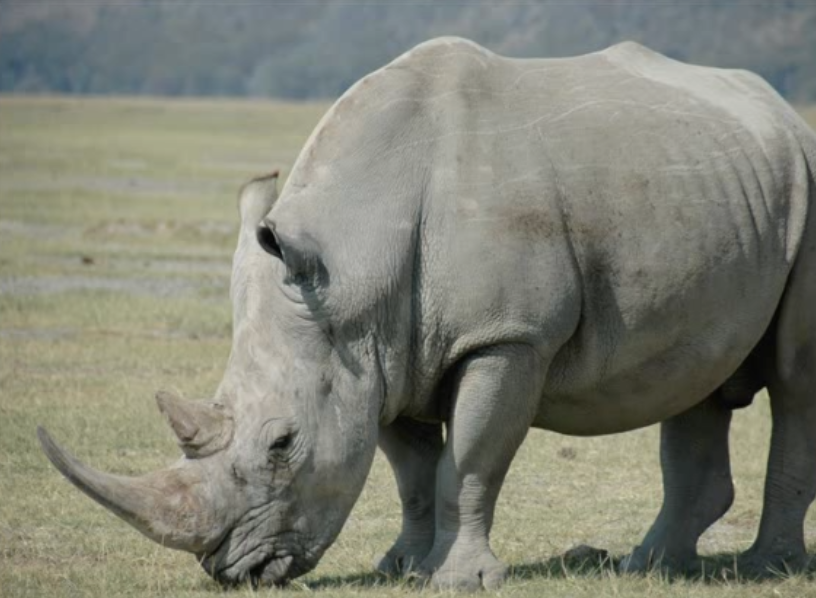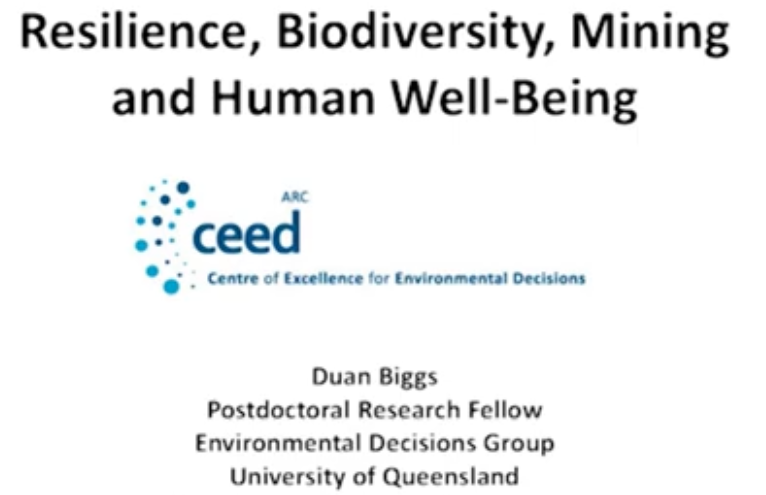FOUNDER
Duan Biggs
Associate Professor and Olajos-Goslow Chair of Environmental Science and Policy Northern Arizona University
NAU School of Earth and Sustainability Faculty Page: https://ses-nau.org/
Researchgate: https://bit.ly/2IuzTOe
Academia: https://bit.ly/2TSQWz7
Google Scholar citations: https://bit.ly/336Aqzt
Adjunct appointments
Griffith University Centre for Planetary Health and Food Security: https://www.griffith.edu.au/centre-planetary-health-food-security
Stellenbosh University Centre for Sustainability Transitions: https://www0.sun.ac.za/cst/person/dr-duan-biggs/

Duan is the founder of the Resilient Conservation lab. He was born in Namibia and grew up there and in South Africa’s Kruger National Park. From his days as a University undergraduate in South Africa, he has worked at the interface of science and conservation policy and practice. He focusses on developing partnerships between researchers and NGOs, governments, and the private sector to conduct science that informs the development of conservation actions and policies for the complex challenges of the Anthropocene. He completed his Ph.D. at the Centre of Excellence for Coral Reef Studies at James Cook University in 2011 on the resilience of coral reef tourism to global change and crises. During his Ph.D. he worked closely with researchers from the Resilience Alliance (www.resalliance.org), links that he maintains closely to this day. After his Ph.D. Duan worked for Scientific Services of South African National Parks to develop a tourism research program to support decision-making and management of the trade-offs and synergies between conservation and tourism for all the country’s National Parks. Subsequent to this he was a Postdoctoral Research Fellow with Hugh Possingham at the Centre of Excellence for Environmental Decisions at the University of Queensland. Duan also completed a Masters by research at the University of Cape Town on developing community-based birdwatching tourism for conservation and development. This work was done in partnership with BirdLife South Africa.
Duan has been working actively with policy-makers and international NGOs on the response to Africa’s Illegal Wildlife Trade crisis and contributes to international policy discussions on the illegal wildlife trade and the management of conflict between humans and wildlife through his work with WWF, the Luc Hoffmann Institute, the International Institute for Environment and Development and the IUCN’s Sustainable Use and Livelihood’s Specialist Group and the World Commission for Protected Areas. Duan was awarded an Australian Research Council Early Career Fellowship (DECRA) in 2016 and started working as a Senior Research Fellow at the Environmental Futures Research Institute at Griffith University in August 2016. Since 2018 Duan has been leading an initiative in close collaboration with the Luc Hoffmann Institute, IUCN and WWF in the creation of a first global standard for human wildlife coexistence. The COVID-19 pandemic has placed unprecedented pressure on human communities living near or inside protected areas in Africa, Asia and the America’s. An estimated USD$ 910 billion - USD$ 1 trillion in tourism revenue was lost in 2020 and this loss of revenue has exacerbated the effects of human-wildlife conflict . This new human-wildlife coexistence standard will be an international first, laying the groundwork for a more sustainable and inclusive conflict mitigation framework in these areas.
Duan has adjunct appointments at the Centre for Biodiversity and Conservation Science, School of Biological Sciences at the University of Queensland, and at both the School of Public Leadership and the Department of Conservation Ecology and Entomology at Stellenbosch University in South Africa. Duan is an enthusiastic naturalist and fervent birdwatcher. He is an associate of Birding Ecotours and has developed and led birding tours and expeditions in countries around the world.
SELECTED TALKS AND MEDIA

Key Publications
Gallo-Cajiao, E., Lieberman, S., Dolšak, N., Prakash, A., Labonté, R., Biggs, D…. & Wiktorowicz, M. (2023). Global governance for pandemic prevention and the wildlife trade. The Lancet Planetary Health, 7(4), e336–e345. https://doi.org/10.1016/S2542-5196(23)00029-3
Rudd, L. F., Allred, S., Bright Ross, J. G., Hare, D., Nkomo, M. N., Shanker, K., Allen, T., Biggs, D… et al. (2021). Overcoming racism in the twin spheres of conservation science and practice. Proceedings of the Royal Society B, 288(1962), 20211871. https://doi.org/10.1098/rspb.2021.1871.
Biggs, D., Caceres-Escobar, H., Kock, R., Thomson, G., & Compton, J. (2021). Extend existing food safety systems to the global wildlife trade. The Lancet Planetary Health, 5(7), e402-e403. https://doi.org/10.1016/S2542-5196(21)00142-X.
Cooney, R., Roe, D., Dublin, H., Phelps, J., Wilkie, D., Keane, A., Travers, H., Skinner, D., Challender, D., Allan, J.R., Biggs, D. (2016). From poachers to protectors – engaging local communities in solutions to illegal wildlife trade. Conservation Letters, 10(3), 367-374. 10.1111/conl.12294
Cumming G., Allen C., Biggs, D et al. (2015) Understanding protected area resilience: a multi-scale, social-ecological approach. Ecological Applications 25, 299-319. https://doi.org/10.1890/13-2113.1
Biggs D., Hicks C.C., Cinner J.E., Hall C.M. (2015) Marine tourism in the face of global change: The resilience of enterprises to crises in Thailand and Australia. Ocean & Coastal Management 105, 65-74. https://doi.org/10.1016/j.ocecoaman.2014.12.019
Moore, M., Tjornbo, O., Enfors, E., Knapp, C., Hodbod, J., Baggio, J., Norstrom, A., et al., Biggs, D. (2014) Studying the complexity of change: toward an analytical framework for understanding deliberate social-ecological transformations. Ecology and Society 19(4): 54. http://dx.doi.org/10.5751./ES-06966-190454.
Biggs, D., Courchamp F., Martin, R., Possingham, H. (2013). Legal trade of Africa’s rhino horns. Science 339:1038-1039. 10.1126/science.1229998.
Biggs, R., Schlüter, M., Biggs, D., Bohensky, E., BurnSilver, S., Cundill, G., Dakos, V., et al. (2012). Toward principles for enhancing the resilience of ecosystem services. Annual Review of Environment and Resources, 37, 421-448. https://doi.org/10.1146/annurev-environ-051211-123836.
Biggs D., Hall, C., Stoeckl, N. (2012). The resilience of formal and informal tourism enterprises to disasters – the case of reef tourism in Phuket. Journal for Sustainable Tourism 20: 645-665. https://doi.org/10.1080/09669582.2011.630080.
Biggs, D., Abel, N., Knight, A., Leitch, A., Langston, A., Ban, N. (2011). The implementation crisis in conservation planning – could mental models help? Conservation Letters 4:169-183. 10.1111/j.1755-263X.2011.00170.x
Biggs, D. (2011). Understanding Resilience in a Vulnerable Industry: the Case of Reef Tourism in Australia. Ecology and Society 16(1): 30. 10.5751/ES-03948-160130






